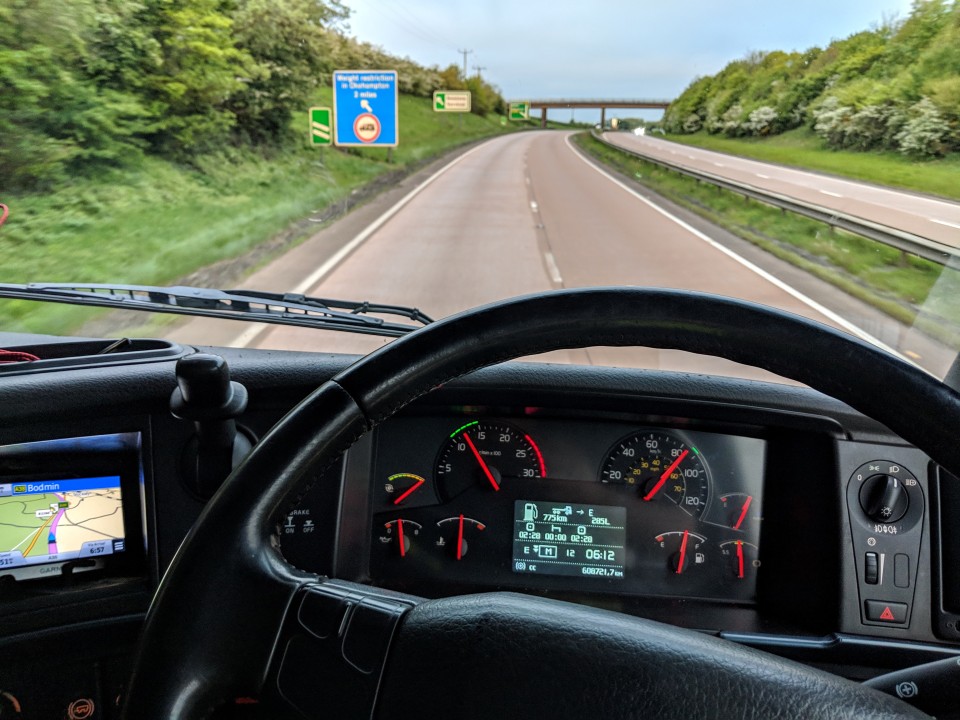
Susie Jones
Come essere un camionista sano
Creato: 27/08/2024
•
Aggiornato: 27/08/2024
In quanto professione impegnativa, la guida di camion comporta spesso orari prolungati, uno stile di vita sedentario e lunghi periodi di assenza da casa, che spesso possono avere ripercussioni sulla salute di molti conducenti.
Abitudini poco salutari come il consumo di fast food, la mancanza di attività fisica e un sonno disturbato possono portare a potenziali complicazioni per la salute in futuro. Ma come si fa a rimanere in forma come camionista? È più facile a dirsi che a farsi, ma abbiamo stilato un elenco di consigli che vi aiuteranno a mantenervi in forma durante il viaggio.
Sei consigli per mantenersi in salute in viaggio
1.Idratazione
Un consiglio semplice e un bene che spesso diamo per scontato, ma la maggior parte dei problemi di salute deriva dalla disidratazione. Sorseggiare regolarmente acqua o spremute nel corso della giornata consente di espellere le scorie metaboliche e le tossine dall'organismo e di mantenersi più energici e vigili. Tenere con sé una bottiglia d'acqua ricaricabile non solo vi ricorderà di mantenervi idratati, ma sarà anche più utile per l'ambiente.
2.Dieta
La tentazione di mangiare al fast food dopo una lunga giornata è qualcosa che tutti possiamo capire, tuttavia, proprio come il mantenimento dell'idratazione, la dieta gioca un ruolo importante per la vostra salute e per come vi sentirete durante la giornata.
Si consiglia agli autisti di camion di mangiare tre o quattro volte al giorno, due pasti e due spuntini o due pasti e uno spuntino. Cercate di mantenere un piano di pasti e spuntini ad alto contenuto di omega-3, ferro e vitamina C, come verdure a foglia verde, pesce e frutta. Evitate di consumare frequentemente cibi e bevande come pasta, pane, bevande dolci e stimolanti come caffè e bevande energetiche.
Date un'occhiata al nostro elenco di spuntini sani da tenere in cabina:
Barrette di granola
Barrette energetiche
Popcorn
Noci
Frutta secca
Cioccolato fondente
Oltre ad acquistare cibi sani mentre si è in viaggio, a volte può essere più sano ed economico preparare i pasti. Frieghtech ha una fantastica selezione di ricette per aiutarvi a mantenere una dieta sana durante il lavoro.
3.Sleep
A causa della natura del lavoro, dormire a sufficienza può essere difficile per un camionista e può portare a risultati devastanti per tutti coloro che si trovano sulla strada.
Semplici consigli e trucchi, come quelli che seguono, possono aiutarvi a riposare bene la notte:
Create in cabina un ambiente che vi faccia sentire a casa. Consultate il nostro post su come trasformare la cabina del vostro camion in una casa
Mantenere la zona notte buia
Una doccia calda: Utilizzate la nostra pagina mappe per scoprire quali aree di sosta per camion offrono questo servizio.
Provate alcune applicazioni per aiutarvi a dormire
Trovate il posto ideale per parcheggiare con poco rumore e poco disturbo. La nostra app intruck offre 5.000 punti di parcheggio per mezzi pesanti in tutta Europa tra cui scegliere, mentre il nostro team SNAP Access and Security è in grado di fornire soluzioni di sicurezza su misura, consentendovi di dormire sonni più tranquilli sapendo che voi e il vostro camion siete al sicuro.
4.Esercizio fisico
Uno dei consigli più difficili da seguire quando si è in viaggio, ma comunque importante. Stare seduti per molte ore al giorno può portare a una postura scorretta, a dolori alla schiena e a potenziali complicazioni per la salute. Dopo una lunga giornata al volante, si può essere tentati di sedersi e rilassarsi, ma 15 minuti di attività, come camminare o fare stretching, possono farvi sentire ringiovaniti e meno stressati.
HMD Trucking propone alcuni esercizi utili per gli autisti di camion, se volete incorporare diversi tipi di esercizio fisico nella vostra routine.
5.Vitamine
Essere in viaggio a tempo pieno può rendere difficile l'assunzione di tutte le vitamine necessarie. L'assunzione di un multivitaminico al giorno può rafforzare il sistema immunitario e aiutare a mantenersi in salute.
6.Salute mentale
Sappiamo che prendersi cura della propria salute fisica sulla strada è importante, ma quanto tempo dedicano i camionisti alla propria salute mentale?

L'associazione di beneficenza per la salute mentale Mind ha pubblicato delle statistiche che rivelano che il 30% delle malattie professionali autodenunciate nel settore dei trasporti e della logistica sono dovute ad ansia, solitudine, stress e depressione. L'associazione ha anche affermato che questo numero potrebbe essere più alto, poiché la maggior parte delle persone non cerca l'aiuto di cui ha bisogno. Inoltre, il 95% delle persone che si assentano dal lavoro per malattia non fornisce il vero motivo dell'assenza dal lavoro se si tratta di salute mentale.
Seguire i suggerimenti e i trucchi di cui sopra può avere un effetto positivo sulla vostra salute mentale. Inoltre, è importante avere conversazioni aperte e oneste con altri camionisti, supervisori o spedizionieri.
L'esercizio fisico può migliorare la guida?
Non solo uno stile di vita sano porta a una migliore salute mentale, ma è dimostrato che può anche rendere i conducenti migliori. Uno studio ha dimostrato che i conducenti a cui è stato chiesto di fare attività fisica quotidianamente hanno mostrato una maggiore facilità nel girare la testa, sono stati in grado di ruotare maggiormente il corpo e sono riusciti a salire in macchina più rapidamente.
Qual è la parte più difficile dell'essere un camionista?
Le lunghe ore di lavoro sembrano essere uno degli aspetti più difficili della guida dei camion. I camionisti devono spesso affrontare lunghi chilometri da percorrere e orari antisociali. Questi lunghi chilometri e gli orari antisociali possono portare a uno stile di vita non sano.

Quanto è malsano essere un camionista?
A causa dello stile di vita di molti camionisti, è statisticamente più probabile che essi abbiano problemi di salute rispetto a chi svolge altre professioni. I camionisti devono spesso affrontare alcuni ostacoli come spazi di lavoro angusti, situazioni di stress, schemi di sonno insoliti e mancanza di cibo nutriente che hanno tutti un'influenza sulla loro salute.
Mantenere uno stile di vita sano come camionista richiede uno sforzo consapevole, ma i benefici che ne derivano ne valgono la pena. I consigli di cui sopra vi permetteranno di prendere il controllo della vostra salute e di migliorare il vostro benessere. Tenete d'occhio altri suggerimenti e trucchi da parte di SNAP.



